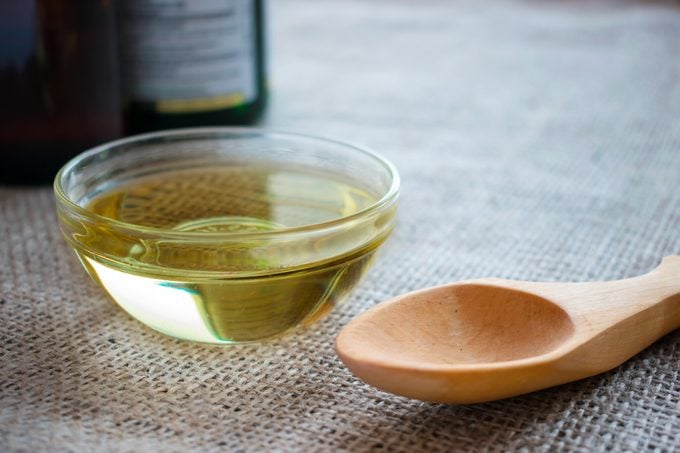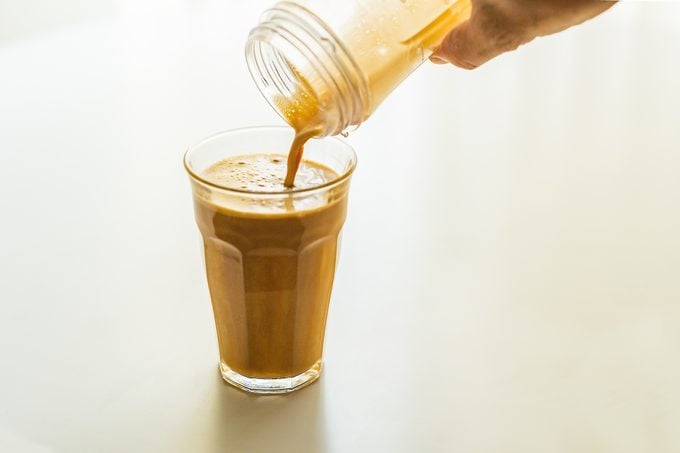What is MCT Oil? Nutrition Facts You Should Know
Updated: Mar. 14, 2022
If you've heard of Bulletproof coffee, you've probably also heard of MCT oil. Here are MCT oil benefits and why you might want to incorporate it into your diet, according to a registered dietitian.
What you need to know about MCT oil
You may have come across an option to add MCT to your order at your local trendy coffee shop. Many believe it helps with weight loss, but is it true?
Here’s what you need to know about the potential benefits of MCT oil and why so many keto dieters swear by it.
MCT oil is popular
MCT oil has gained popularity in recent years, along with the ketogenic diet. This is no coincidence, as the two go hand in hand.
The keto diet is an eating plan that encourages a super low intake of carbohydrates, paired with a high intake of fat. That low-carb/high-fat combination forces the body to enter into a state of ketosis. Ketosis is a state in which the body uses and burns fat—rather than carbohydrates, its preferred fuel—for energy.
Given that the ketogenic diet encourages a high intake of fat, different types of fats have become popular, particularly those fats that encourage the formation of ketones and help maintain ketosis. It’s also difficult to comprise your diet mainly of fat, so many keto dieters are looking for creative ways to incorporate fats. Remember when coconut oil was the holy grail? MCT oil is having a similar moment, and in fact, coconut oil contains more MCT than other types of oil.
What is MCT oil?
MCT stands for medium-chain triglycerides, which are fats that are partially man-made. Medium-chain refers to the chemical arrangement of the carbon atoms, while triglycerides are a type of fat that is usually stored or burned for energy. MCT oil is a supplement that is often derived from processing coconut oil or palm kernel oil, which contain medium-chain triglycerides. (Here are the healthiest cooking oils.)
In contrast, foods such as fish, avocado, nuts, safflower oil, and soybean oil, contain long-chain triglycerides.
What makes MCT oil different from other fats is the way the body breaks it down. Fats are made of fatty acid molecules, and the length of the fatty acid chain determines the digestion process. Bile and enzymes secreted by the pancreas digest many types of fat. They are then absorbed and transported through the bloodstream to the liver.
Digesting medium-chain triglycerides, however, is much faster and simpler. They do not require bile or pancreatic enzymes—therefore, they are delivered more quickly to the liver, where they metabolize into ketones, which are used as energy.

MCT oil nutrition and benefits
One tablespoon of MCT oil contains about 120 calories, 14 grams of fat, and no protein or carbs. Just one tablespoon contains about 18 percent of the daily recommended amount of fat, according to the USDA.
While research on MCT oil is ongoing, it has some known benefits. Here are the MCT oil benefits you need to know.
Fat absorption
The rapid and streamlined digestion of MCT oil is helpful in people with fat absorption disorders. Examples of such disorders include celiac disease, cystic fibrosis, and IBS (irritable bowel syndrome).
Additionally, it can be beneficial for patients who have just had gastrointestinal surgery, as they typically experience difficulty absorbing fat. (Here are the healthiest high-fat foods.)
Weight loss
There is not a lot of research on the relationship between MCT oil consumption and weight loss, but many people believe the two are intertwined. A study of healthy adults, published in 2015 in the Journal of the Academy of Nutrition and Dietetics, found that MCT oil consumption resulted in slightly reduced body weight, total body fat, and waist circumference when compared with consumption of long-chain triglycerides.
Additionally, the satiating quality of MCT oil can lend itself to weight loss. Consumption of MCT causes the body to release the hormones leptin and peptide YY, both of which decrease appetite and signal the body to stop eating, according to the European Journal of Clinical Nutrition. This can lead to less caloric consumption, which can potentially result in weight loss.
Athletic performance
Studies have shown that consuming MCT oil can have a positive effect on physical performance. When you exercise, you produce lactic acid, a waste product of anaerobic metabolism, per Advanced Sports Medicine Concepts and Controversies. It is typically what causes the fatigue or burning sensation you feel when working out intensely.
Studies, including one in the Journal of Nutritional Science and Vitaminology, suggest that consuming MCT oil with food may help lower the buildup of lactate when exercising.
Diabetes
Another area of research is that of the relationship between MCT oil consumption and diabetes. Some research suggests that supplementation with MCT oil may help stabilize blood sugar. While more research is necessary, an early study in the journal Metabolism suggests that people with type 2 diabetes who consumed MCT oil daily experienced weight loss and increased insulin sensitivity when compared to those who consumed long-chain triglycerides.
However, anybody with diabetes considering taking MCT oil should consult their doctor before doing so.
Who should not take MCT oil?
While MCT oil is generally safe for consumption, it can present certain side effects. The most common are diarrhea, abdominal pain, and general stomach discomfort.
To play it safe, start with a very small amount each day, and increase as tolerable. If you want to try it, I suggest starting with one teaspoon a day, and working your way up to a tablespoon. Additionally, taking MCT oil on an empty stomach may bring some discomfort. Try taking it with food if you experience symptoms.
Women who are pregnant or breastfeeding should consult with their doctor before taking MCT oil. While it is generally safe, the research on consumption in this group is quite limited.
How to use MCT oil
To get the benefits of MCT oil you have to take it, of course. But here’s the thing: It’s essentially flavorless and it has an oily mouthfeel, just like any other dietary oil. So I wouldn’t suggest taking it straight up—that won’t be enjoyable. Instead, mix it into drinks or smoothies. (Check out the best MCT oils recommended by experts.)

Bulletproof coffee
You’ve heard of bulletproof coffee, right? Also known as butter coffee or keto coffee, it’s essentially a blend of coffee and fat—typically ghee or MCT oil. It’s a popular breakfast option for those who follow the ketogenic diet or practice intermittent fasting.
I can say from personal experience, it’s quite delicious. You can try blending your coffee with a teaspoon of MCT oil, a teaspoon of ghee, a splash of unsweetened almond milk, and a dash of cinnamon. I kid you not: It tastes like a cinnamon latte. (Here’s what happens if you drink coffee every day.)
You can also add a scoop or two of unflavored collagen peptides for extra protein. I will never encourage you to skip breakfast. But if you’re having a rushed morning and don’t have time to make a meal, this is a great option.
Smoothies
You can also add MCT oil to smoothies. Just take your normal smoothie recipe, and blend in anywhere from a teaspoon to a tablespoon of MCT oil. Many people are even baking with MCT oil these days. You can substitute some or all of the oil in a baked-good recipe for MCT oil, and it likely won’t alter the taste.
Bottom line
Is MCT oil necessary? No. Do we need it to achieve our health goals? Absolutely not. Are there MCT oil benefits? Yes. Does it present any dangerous risks? For most people, not really. Is there any harm in trying it? Most likely, no.
I say go for it if you want to try MCT oil. Just be careful with the amount, and monitor how you feel when you take it. And if you feel absolutely no desire to jump on the MCT train, that’s totally fine, too.




















